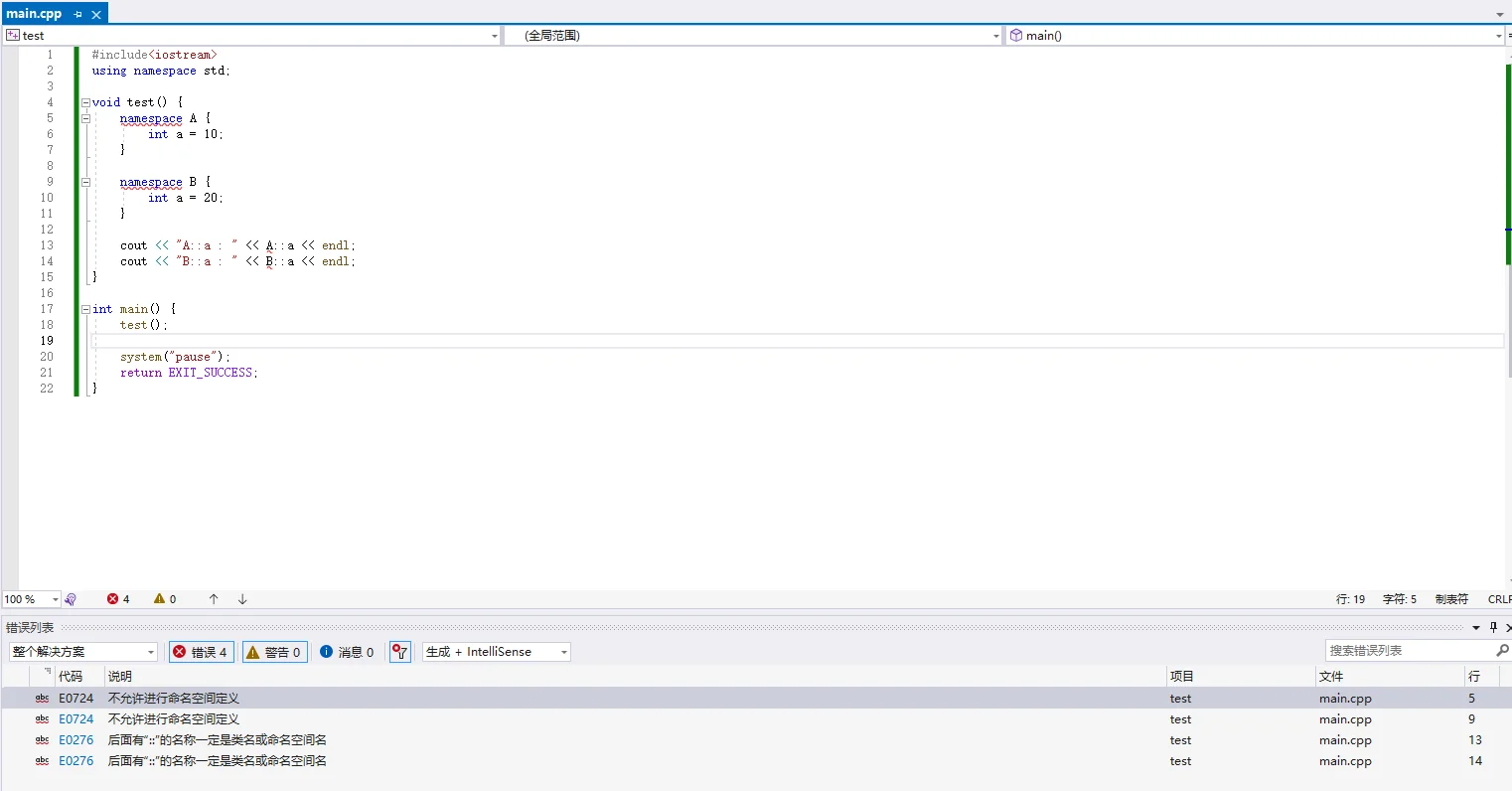名字控制
创建名字是程序设计过程中一项最基本的活动,当一个项目很大时,它会不可避免地包含大量名字。C++允许我们对名字的产生和名字的可见性进行控制。
我们之前在学习C语言可以通过static关键字来使得名字只得在本编译单元内可见,在C++中我们将通过一种通过命名空间来控制对名字的访问。
命名空间
在C++中,名称(name)可以是符号常量、变量、函数、结构、枚举、类和对象等等。工程越大,名称互相冲突性的可能性越大。另外使用多个厂商的类库时,也可能导致名称冲突。为了避免在大规模程序的设计中以及在程序员使用各种各样的C++库时这些标识符的命名发生冲突,标准C++引入关键字namespace(命名空间/名字空间/名称空间),可以更好地控制标识符的作用域。
- 命名空间用途:
- 命名空间下可以存放 : 变量、函数、结构体、类…
命名空间具有以下特性
- 命名空间必须要声明在全局作用域
- 命名空间可以嵌套命名空间
- 命名空间是开放的,可以随时将新成员添加到命名空间下
- 命名空间可以匿名的
- 命名空间可以起别名
使用语法
创建一个命名空间
点击查看代码示例
cpp#include <iostream> using namespace std; namespace A{ int a = 10; } namespace B{ int a = 20; } int main(int argc, char const *argv[]) { cout << "A::a = " << A::a << endl; cout << "B::a = " << B::a << endl; return 0; }程序输出:
shellA::a = 10 B::a = 20点击查看示例
cvoid test() { //在函数体内部不允许创建命名空间 namespace A { int a = 10; } //IDE直接对命名空间A、B报错,程序无法进行编译 namespace B { int a = 20; } cout << "A::a : " << A::a << endl; cout << "B::a : " << B::a << endl; }
命名空间可嵌套命名空间
点击查看代码示例
cpp#include <iostream> using namespace std; namespace A{ int a = 10; // 命名空间可以嵌套 namespace B{ int a = 20; } } int main(int argc, char const *argv[]) { cout << "A::a = " << A::a << endl; cout << "A::B::a = " << A::B::a << endl; return 0; }程序输出:
shellA::a = 10 A::B::a = 20命名空间是开放的,即可以随时把新的成员加入已有的命名空间中
点击查看代码示例
cpp#include <iostream> using namespace std; namespace A{ int a = 10; } /* 当命名空间A没有被定义的情况下,下面的语句会创建一个name为A的命名空间;当命名空间A已经被创建了,下面的语句会往命名空间A中追加内容 */ //然后尝试往A中添加内容 namespace A { void func() { cout << "hello namespace!" << endl; } } int main(int argc, char const *argv[]) { cout << "A::a : " << A::a << endl; A::func(); return 0; }程序输出:
shellA::a : 10 hello namespace!声明和实现可分离
点击查看代码示例
cpp#pragma once namespace MySpace { void func1(); void func2(int param); }cpp#include <iostream> #include "head.h" using namespace std; void MySpace::func1() { cout << "MySpace::func1" << endl; } void MySpace::func2(int param) { cout << "MySpace::func2 : " << param << endl; } int main(int argc, char *argv[]) { MySpace::func1(); MySpace::func2(10); return 0; }shellMySpace::func1 MySpace::func2 : 10无名命名空间,意味着命名空间中的标识符只能在本文件内访问,相当于给这个标识符加上了
static关键字,使得其可以作为内部连接。点击查看代码示例
cpp#include <iostream> using namespace std; namespace { int a = 10; void func() { cout << "hello namespace" << endl; } } int main(int argc, char *argv[]) { cout << "a : " << a << endl; func(); return 0; }程序输出:
shellMySpace::func1 MySpace::func2 : 10命名空间别名:命名空间的别名并不是通过
typedef来定义的,直接使用namespace进行定义别名。点击查看代码示例
cpp#include <iostream> using namespace std; namespace veryLongName { int a = 10; void func() { cout << "hello namespace" << endl; } } int main(int argc, char *argv[]) { namespace shortName = veryLongName; cout << "veryLongName::a : " << shortName::a << endl; veryLongName::func(); shortName::func(); return 0; }程序输出:
shellveryLongName::a : 10 hello namespace hello namespace
using声明
using声明可使得指定的标识符可用。语法:using xxx::xxx;
点击查看代码示例
#include <iostream>
using namespace std;
namespace A {
int paramA = 20;
int paramB = 30;
void funcA() { cout << "hello funcA" << endl; }
void funcB() { cout << "hello funcA" << endl; }
}
int main(int argc, char *argv[]) {
//1. 通过命名空间域运算符
cout << A::paramA << endl;
A::funcA();
//2. using声明
using A::paramA;
using A::funcA;
cout << paramA << endl;
//cout << paramB << endl; //不可直接访问
funcA();
//3. 同名冲突
//int paramA = 20; //相同作用域注意同名冲突
return 0;
}程序输出:
20
hello funcA
20
hello funcA点击查看代码示例
#include <iostream>
using namespace std;
namespace A{
int a = 10;
}
int main(int argc, char *argv[]){
//使用using声明访问A里面的a
using A::a;
cout << a << endl;
//如果现在在main函数作用域内在定义一个同名的a
//此时出现就近原则,按照以往想法打印的是main里面定义的a
//但事实是两个a都不可以访问,编译失败
int a = 20;
//cout << a << endl;
//即使通过命名空间域运算符来访问,仍然是失败的
//编程时需要特别注意
//cout << A::a << endl;
return 0;
}using声明碰到函数重载 如果命名空间包含一组用相同名字重载的函数,using声明就声明了这个重载函数的所有集合。
点击查看代码示例
#include <iostream>
using namespace std;
namespace A {
void func() {
cout << "func()" << endl;
}
void func(int x) {
cout << "func(x),x=" << x << endl;
}
int func(int x, int y) {
cout << "func(x,y),x+y=" << x + y << endl;
return x + y;
}
}
int main(int argc, char *argv[]) {
using A::func;
func();
func(10);
func(10, 20);
return 0;
}程序输出:
func()
func(x),x=10
func(x,y),x+y=30using编译指令
using编译指令使整个命名空间标识符可用。语法:using namespace xxx;
点击查看代码示例
#include <iostream>
using namespace std;
namespace A {
int paramA = 20;
int paramB = 30;
void funcA() { cout << "hello funcA" << endl; }
void funcB() { cout << "hello funcB" << endl; }
}
void test01() {
using namespace A;
cout << paramA << endl;
cout << paramB << endl;
funcA();
funcB();
//不会产生二义性
int paramA = 30;
cout << paramA << endl;
}
namespace B {
int paramA = 20;
int paramB = 30;
void funcA() { cout << "hello funcA" << endl; }
void funcB() { cout << "hello funcB" << endl; }
}
void test02() {
using namespace A;
using namespace B;
//二义性产生,不知道调用A还是B的paramA
//cout << paramA << endl;
//如果此时要访问,需要使用命名空间作用域运算符区分
}
int main(int argc, char *argv[]) {
test01();
test02();
return 0;
}注意
点击查看代码示例
#include <iostream>
using namespace std;
namespace A{
int a = 10;
}
int main(int argc, char *argv[]){
int a = 20;
//使用using编译指令
using namespace A;
cout << a << endl;
return 0;
}程序输出:
20总结
我们刚讲的一些东西一开始会觉得难一些,这些东西以后还是挺常用,只要理解了它们的工作机理,使用它们非常简单。
需要记住的关键问题是当引入一个全局的using编译指令时,就为该文件打开了该命名空间,它不会影响任何其他的文件,所以可以在每一个实现文件中调整对命名空间的控制。比如,如果发现某一个实现文件中有太多的using指令而产生的命名冲突,就要对该文件做个简单的改变,通过明确的限定或者using声明来消除名字冲突,这样不需要修改其他的实现文件。